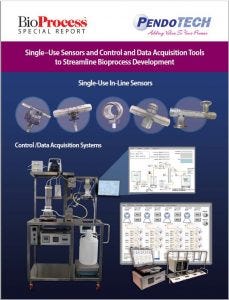- Sponsored Content
- Information Technology
- PAT
- Process Monitoring and Controls
Single-Use Sensors and Control and Data Acquisition Tools to Streamline Bioprocess DevelopmentSingle-Use Sensors and Control and Data Acquisition Tools to Streamline Bioprocess Development
October 4, 2018
Sponsored Content
 Process development and biomanufacturing in the biopharmaceutical industry have evolved extensively over the past 10 years. More tools are available to study process variables to enable more efficient and productive processes, speed development, and reduce costs. High powered microcontrollers are embedded in laboratory devices to carry out complex tasks. Recently, users have started working with microcontrollers such as Raspberry Pi for personal projects.
Process development and biomanufacturing in the biopharmaceutical industry have evolved extensively over the past 10 years. More tools are available to study process variables to enable more efficient and productive processes, speed development, and reduce costs. High powered microcontrollers are embedded in laboratory devices to carry out complex tasks. Recently, users have started working with microcontrollers such as Raspberry Pi for personal projects.
As personal computer power has accelerated multiplefold,leading to high processing power and compact, high-capacity memory readily available for process development engineers, scientists, and suppliers, laboratories are generating large amounts of data. Data analysis tools previously restricted to high-power computer workstations can be accomplished with simple PCs. Powerful, efficient, and user-friendly software can automate laboratory processes and trend, log, and analyze the data they generate.
PendoTECH process control systems for downstream process development were developed and improved over the past decade to take advantage of advances in PC and microcontroller technology. Collaborating and listening to customers was key to designing the initial product features and implementing improvements over time. Networked PCs and high-level control systems allow data sharing with common databases such as the PI historian system from OSIsoft, further speeding analysis of data coming from many different process systems and analyzers concurrently.
Manufacturing trends in single-use technology have promulgated the industry with evolution and refinement of the technology and organizations such as the BioProcess Systems Alliance (BPSA) to facilitate dialog between users and suppliers and assist in addressing concerns. In many cases, disposables have become the most logical option. The advantages of eliminating cleaning/sterilization validation and associated costs related to large capital infrastructure have led to increasing and rapid implementation of single-use processes in facilities.
In the growing areas of cell and gene therapy processing, single-use technology is vital to handling large numbers of small batches and biohazardous materials. High-performance product-contact films to make process bags and bioreactors, tubing, filters, columns, connectors, and sensors are key pieces of the puzzle of creating a single-use process. PendoTECH has focused extensive product development efforts over the years on new types of sensors and an expanding size range to adapt to different process types and scales. Sensors are used in many critical applications to monitor processes and enable decision making. A range of sensor monitors with features required to both read them and transmit their data have been qualified for use by many companies, even for lengthy continuous processes.
Qualification data and technical reports are being released to help users implement these sensors into their processes. Our entire staff is committed to creating unique products with the utility to increase efficiency and solve process problems, to manufacture those products to high quality, and to deliver them to market through efficient internal operations in our ISO 9001:2015 registered quality system.
—Jim Furey
This Special Report eBook includes the following articles:
Using In-Line Disposable Pressure Sensors to Evaluate Depth Filter Performanceby Lee R. Bink and James Furey
Streamlining Downstream Process Development: An Integrated and Automated System for Normal-Flow Filter Screening Experimentsby Brian Kluck, Binh Thai, Jim Furey, and Dennis Annarelli
Evaluation of a New Single-Use UV Sensor for Protein A Captureby Paul Renaut and Dennis Annarelli
Measuring Pressure at Very Low Levels with High Accuracy in Single-Use Systems: Improved Performance and Single-Use System Testingby Dennis C. Annarelli, Jim Furey, Benjamin Less, and Joshua Huang
In-Line Turbidity Sensors for Monitoring Process Streams in CCTCby Dmitriy Fedorenko, Jasmine Tan, Oleg Shinkazh, and Dennis Annarelli
A UF–DF Screening System for Bioprocess Development: Efficient and Cost-Effective Process Fit and Scale-Up to Manufacturingby Atul Bhangale, Yan Chen, Anurag Khetan, and Jim Furey
Just fill out the form to download the complete special report eBook now.
You May Also Like






